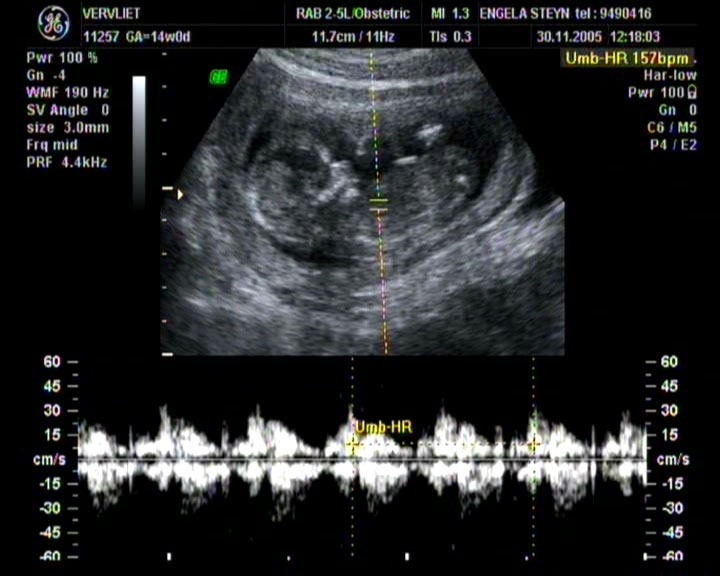
Fetal Heart Rate: An Overview
18 Dec 2017 | 4 min Read
Babychakra
Author | 1369 Articles
Listening to the very first signs of life!
Are you looking for a heartbeat?
Ever since you discover that you are pregnant, the one thing you are most excited about is hearing the ‘thump thump’ sounds of the baby’s heartbeat. It is the most reassuring sound for every mom-to-be. Even if it sounds just the same throughout pregnancy, many changes occur to the heart and the circulatory system. The number of fetal heart sounds recorded in one minute is known as fetal heart rate. See when you can hear the heartbeat of your baby and more! Keep on reading.
What Is Fetal Heart Rate?

The sound generated by a baby’s heartbeat is known as fetal heart sound. The number of fetal heart sounds recorded in one minute is known as fetal heart rate. The baby’s heart sounds can be used as indicators for the state and the stage of pregnancy, and it can even be used to point out any abnormalities. Fetal heart rate is between 120 to 160 beats per minute in a normal healthy pregnancy.
When Does A Fetus Have A Heartbeat?
Doctors know that the heart muscle known as the myocardium is formed approximately 3 weeks after conception. However, the generated heartbeat is shallow to be picked up on a sonogram at this stage. By the end of 6 weeks, you can hear the fetal heart sounds on an ultrasound. At the end of 9 to 10 weeks, the baby’s heart sounds are strong enough to be heard on a doppler machine. The baby’s heart rate increases as the pregnancy advance.
Listen to the heart sounds of a mother who is carrying twins in this exciting video. (which video?)
Source: Jessica hamilton
What Does Fetal Heart Rate Tell You About?
Fetal heart rate monitoring generally monitors your baby’s heart rate and rhythm (fetus). This allows your healthcare professional to monitor your baby’s progress.
Normal Fetal Heart Rate During Pregnancy
If it’s over 140 BPM, you’re having a girl. If your heart rate is less than 140 BPM, you’re carrying a boy. In reality, your baby’s heart will most likely begin to beat around week 6 of your pregnancy. Moreover, a fetal heart rate of 110 to 160 BPM is considered normal. However, it might fluctuate between 5 and 25 BPM.
Can Fetal Heart Rate Predict Gender?
No. This old wives’ tale just refuses to die. The fetal heart rate has nothing to do with the gender of the baby, though there are many myths surrounding it. Even scientific studies have proven that there is no connection between fetal heart rates and the gender of the baby.
What Do A Baby’s Heartbeats Sound Like?

Source: health.mil
You may have heard many mothers saying that a baby’s heartbeats sound like a galloping horse. However, you need to ensure that it is the baby’s heart sounds that you are listening to during an antenatal visit. Very often, the umbilical pulsations can be mistaken for fetal heart sounds. Remember that the umbilical cord makes a whooshing sound, but a baby’s heartbeat can be distinctly heard on a doppler making a steady thumping sound.
Takeaway
Your baby’s fetal heart rate may fluctuate as a result of changes in your uterus. A high fetal heart rate might indicate that your kid isn’t getting enough oxygen or that something else is wrong. As a result, a high-quality prenatal vitamin that contains the naturally occurring, activated form of folate- L-methylfolate, is recommended. Getting folate from genuine foods, such as green veggies, pasture-raised chickens, legumes, eggs from pastured chicks, avocados, seeds and nuts, will be highly beneficial for your baby’s heart. So, follow these instructions and live healthy and safe motherhood.
Know the difference between a mother’s and baby’s heart sound in this video- (which video?)
Source: Matthew Hillyard
Disclaimer: The information in the article is not intended or implied to be a substitute for professional medical advice, diagnosis or treatment. Always seek the advice of your doctor.
Also read: Fetal Weight
Related Articles:
Must-Have Nutrition For Healthy Fetal Weight: Here we bring you a quick insight of how mom-to-be’s nutrition intake has an impact on fetal weight every month during the entire journey of pregnancy. Check them out here!
Fetal Weight: Know what fetal weight has to say about your baby’s health.
3 Stages Of Fetal Development: Understanding fetal development month by month is essential to understanding a baby’s health; check out the major 3 stages of fetal development in the mother’s womb.
A


Related Topics for you
Suggestions offered by doctors on BabyChakra are of advisory nature i.e., for educational and informational purposes only. Content posted on, created for, or compiled by BabyChakra is not intended or designed to replace your doctor's independent judgment about any symptom, condition, or the appropriateness or risks of a procedure or treatment for a given person.
